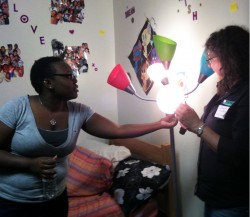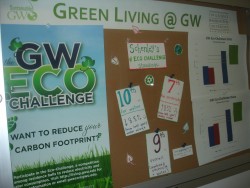Howard University is Biggest Energy Loser In DC Campus Competition
The Alliance to Save Energy News
Howard University is Biggest Energy Loser In DC Campus Competition
Photo above: The Howard University team members accept their awards for achieving the highest percentage reduction in electricity use during the D.C. Campus Challenge residence hall energy competition. From left to right: Timothy McDougle, Nyekah Washington, Katryna Carter and Alfonzye Chisholm.
College Students Cut Energy Use by an Average 7% on 3 DC Campuses
In its first campus energy competition, Howard University students reduced overall energy use by 14% in its participating dorms, out-saving fellow competitors at American and George Washington Universities in the Alliance to Save Energy’s “D.C. Campus Challenge: How Much Can You Power Down?” competition.

Howard University’s Green Team led the energy-saving movement, promoting the competition with social media, energy audits in students’ rooms, educational posters and flyers and by turning off lights in empty hallways and common areas. The team also formed a “study buddy” system encouraging students to do homework with a partner or in small groups in order to light up fewer dorm rooms.
Howard’s Office of Sustainability Director Alfonzye Chisholm Jr. said the competition helps further its main objectives. “We entered this competition to establish a ‘greener’ Howard University operation and environment, to help lead the inclusion of minorities in this worldwide initiative and to help prepare the next leaders in sustainability,” he said. “Winning was a huge statement for all minority institutions.”
All Three DC Campuses Saved Energy
During the month-long competition, students from the three D.C. universities saved enough energy to power 14 houses for a full year. By reducing energy use in their residence halls through education and outreach to fellow students, they saved over 168,000 kWh of electricity in just four weeks – an average reduction of 7% compared to a year earlier.
“Energy competitions like this boost energy awareness, inspire personal behavior changes and increase energy-efficient practices,” said Judi Quach, education project manager at the Alliance. “Plus, they result in electricity and financial savings that benefit our communities and our environment.”
Funded by the District’s Department of the Environment, the Alliance’s competition trained and provided students and staff with resources about energy efficiency and conservation and strategies for running a successful energy competition, including using community-based social marketing. The Alliance also coordinated energy audit training for each campus team with Tamasin Sterner, founder and president of Pure Energy Coach, a company that provides coaching and training in audits, quality assurance inspections and home energy retrofits.

George Washington University: Cupcakes with a Side of Electricity Savings
George Washington University achieved an 8% reduction in electricity use while raising awareness among students about the competition’s positive impact on the community.
“It was awesome to come together to discuss ways that we can share this passion with others to make the world more sustainable,” said Michelle Stuhlmacher, a freshmen Eco-Rep – one of a group of students who shared information about energy efficiency on campus and got students’ attention by handing out free cupcakes with their energy-saving tips. They also let other students record their energy-saving ideas on sustainability pledge trees posted on residence hall walls and marshaled 300 student pledges for a “Turkey Day Shutdown.”
“It is inspiring to see what great conservation achievements were achieved,” noted Sustainability Project Facilitator Sophie Waskow.
 American University: ‘Green Eagles’ Soar with Energy Efficiency
American University: ‘Green Eagles’ Soar with Energy Efficiency
At American University (AU), the Green Eagles spread the word about energy savings, which led to a 3% decrease in electricity use across their residence halls during the competition.
“There's so much power in the American University student body to make sustainable decisions and impact the environment in positive ways,” observed Green Eagle Kayla Ma.
Armed with watt meters and turn-off-the-light stickers, the Green Eagles swapped out inefficient incandescent light bulbs for compact fluorescent lamps. They also helped their peers set energy-efficient power settings on their laptops, urged students to take part in their “Thanksgiving Shutdown” and collected signatures for a sustainability pledge from 20% of the residential student body.
“Our students worked really hard to conserve and spread the word,” said Emily Curley, AU’s sustainability coordinator. “We’re proud to have saved over 20,000 kWh and almost $3,000 while also preventing almost 11 tons of CO2 from entering the atmosphere during the competition.”
Alliance to Save Energy Media Contacts
- Allyson Schmutter 202-448-8759; aschmutter@ase.org
- Ronnie Kweller 202-530-2203; rkweller@ase.org
STAY EMPOWERED
Help the Alliance advocate for policies to use energy more efficiently – supporting job creation, reduced emissions, and lower costs. Contact your member of Congress.
Energy efficiency is smart, nonpartisan, and practical. So are we. Our strength comes from an unparalleled group of Alliance Associates working collaboratively under the Alliance umbrella to pave the way for energy efficiency gains.
The power of efficiency is in your hands. Supporting the Alliance means supporting a vision for using energy more productively to achieve economic growth, a cleaner environment, and greater energy security, affordability, and reliability.
